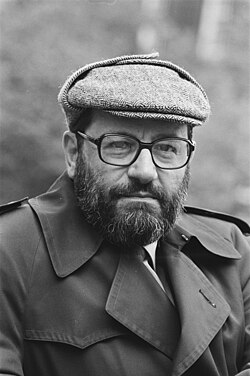Umberto Eco Quote
But is the unicorn a falsehood? It's the sweetest of animals and a noble symbol. It stands for Christ and for chastity; it can be captured only by setting a virgin in the forest, so that the animal, catching her most chaste odor, will go and lay its head in her lap, offering itself as prey to the hunters' snares.So it is said, Adso. But many tend to believe that it's a fable, an invention of the pagans.What a disappointment, I said. I would have liked to encounter one, crossing a wood. Otherwise what's the pleasure of crossing a wood?
Umberto Eco
But is the unicorn a falsehood? It's the sweetest of animals and a noble symbol. It stands for Christ and for chastity; it can be captured only by setting a virgin in the forest, so that the animal, catching her most chaste odor, will go and lay its head in her lap, offering itself as prey to the hunters' snares.So it is said, Adso. But many tend to believe that it's a fable, an invention of the pagans.What a disappointment, I said. I would have liked to encounter one, crossing a wood. Otherwise what's the pleasure of crossing a wood?
Related Quotes
Science has never killed or persecuted a single person for doubting or denying its teaching, and most of these teaching have been true; but religion has murdered millions for doubting or denying her d...
Gratis P. Spencer
Tags:
atheism, atheist, atheist epitaph, devils, dogma, epitaph, eternal torture, fables, fairy tales, fire
Our country is the best country in the world. We are swimming in prosperity and our President is the best president in the world. We have larger apples and better cotton and faster and more beautiful...
John Cheever
Tags:
america, delusions, dissatisfaction, fables, indifference, jokes, life, marriage, prosperity, unemployment
Outbreaks of unvarnished truths in the backyard of our true self can be very precious and inspiring, even though we might inconsistently be tempted to give in to the exhilarating perfume of fables and...
Erik Pevernagie
Tags:
backyard, exhilarating, fables, fairy tales, fiction, flattering, give in, inconsistent, inspiring, outbreaks
About Umberto Eco
Umberto Eco (5 January 1932 – 19 February 2016) was an Italian medievalist, philosopher, semiotician, novelist, cultural critic, and political and social commentator. In English, he is best known for his popular 1980 novel The Name of the Rose, a historical mystery combining semiotics in fiction with biblical analysis, medieval studies and literary theory, as well as Foucault's Pendulum, his 1988 novel which touches on similar themes.
Eco wrote prolifically throughout his life, with his output including children's books, translations from French and English, in addition to a twice-monthly newspaper column "La Bustina di Minerva" (Minerva's Matchbook) in the magazine L'Espresso beginning in 1985, with his last column (a critical appraisal of the Romantic paintings of Francesco Hayez) appearing 27 January 2016. At the time of his death, he was an Emeritus professor at the University of Bologna, where he taught for much of his life. In the 21st century, he has continued to gain recognition for his 1995 essay "Ur-Fascism", where Eco lists fourteen general properties he believes comprise fascist ideologies.
Eco wrote prolifically throughout his life, with his output including children's books, translations from French and English, in addition to a twice-monthly newspaper column "La Bustina di Minerva" (Minerva's Matchbook) in the magazine L'Espresso beginning in 1985, with his last column (a critical appraisal of the Romantic paintings of Francesco Hayez) appearing 27 January 2016. At the time of his death, he was an Emeritus professor at the University of Bologna, where he taught for much of his life. In the 21st century, he has continued to gain recognition for his 1995 essay "Ur-Fascism", where Eco lists fourteen general properties he believes comprise fascist ideologies.
